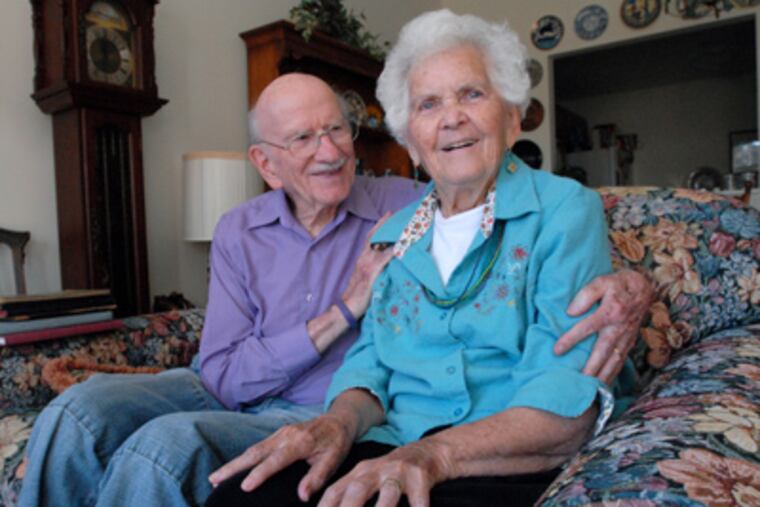Kevin Riordan: Memoir recaptures what memory has lost
Donald R. Fletcher remembers the raspberry dress Martha Bradway wore on their first date in 1940. "She was captivating," he writes in his memoir, Turnings. "Lively, laughing, tossing her brown curls."

Donald R. Fletcher remembers the raspberry dress Martha Bradway wore on their first date in 1940.
"She was captivating," he writes in his memoir, Turnings. "Lively, laughing, tossing her brown curls."
Fletcher, the son of Presbyterian missionaries, married Bradway, a Methodist minister's daughter, on May 19, 1942.
Sixty-eight years later, Don and Martha welcome me to the Lions Gate retirement community in Voorhees, where their apartment holds a tasteful abundance of books, music, artwork, family photos, and mementos of their well-lived life.
Now they also share a burden: Martha, 88, has Alzheimer's.
She and I meet briefly (her smile is vague, but bright) before she leaves with a daytime caregiver. Don handles nights.
"The other evening was the first time she didn't know me, and, oh, that was tough," Don says. "I said, 'Do you know who this is? Do you know me?' "
An ordained clergyman, he wears a violet shirt ("for Alzheimer's awareness") and is gentlemanly, erudite - and strikingly vigorous for 91. He says Martha's confusion "comes and goes . . . which is the way with this illness. Mostly, she does know me."
Martha may no longer be a church musician or a music teacher, but she's still a mother of six, a grandmother of nine, and a soul mate. She's the "inspiration in all that we have shared," Don writes in Turnings, one of four books he has self-published in recent years.
Subtitled Lyric Poems Along a Road, the memoir describes his childhood in Korea and his student days at Princeton in the 1930s and 1940s.
Martha was studying at the nearby Westminster Choir College; they attended a choral performance on their first date.
A few months later, sitting together on a Princeton porch, Don and Martha recognized their shared destiny. "I have found her, or rather . . . in the mystery of God's love, she has been given to me," he wrote in a Nov. 12, 1940, letter to his parents.
The author, who earned degrees in English and theology at Princeton, writes prose and poetry with equal grace. The personal, professional, and spiritual journey he describes in Turnings is enriched by selections from 70 years of his verse.
The poems are about God, the sea, his children - and, of course, his Martha. In a 1968 reflection on their collegiate romance, he writes, "I'll take such mellow sweetness as you are / And leave the fragile fragrance of that spring / To blow its faint regret from long ago."
As their family grew - eventually to three boys and three girls - Don and Martha did missionary work in South America. Don pastored a new congregation in Chile and was an administrator for the Presbyterian church in Mexico and the Caribbean.
He served briefly in postrevolutionary Cuba, as well as in Mississippi during the violent "Freedom Summer."
By the late 1960s, the Fletchers had moved to Cherry Hill and had begun teaching in the township high schools, Don at West and Martha at East. As their children began having families of their own, they eventually retired.
Unexpectedly, their middle son, Alan, came out to his parents as a gay man. In Turnings, Don describes leading a 1998 church service at which "our son and his partner came to stand in front of me, to pledge themselves to one another. . . . It was exhilarating . . . and deeply moving."
Perhaps a dozen years ago, Don began to notice changes in Martha, subtle and isolated at first, then less so.
"There was memory confusion, and then she increasingly had a lot of trouble with language, with finding words," he recalls.
Martha suffered a major setback recently when she fell and broke a hip. She has recovered physically, and they're able to eat together in the Lions Gate dining room.
"But now," Don says, "it's almost impossible to have a conversation with her."
Asked how he's coping, Don reads a poem titled "Evening," written at Martha's bedside in June. It begins:
So we'll talk no more, my love;
The moon is almost down.
Few words are left; none to
express
What we have shared of
loveliness.
He writes that while he reaches Martha "less and less," he keeps faith that "we will talk again . . . in God's harmony."